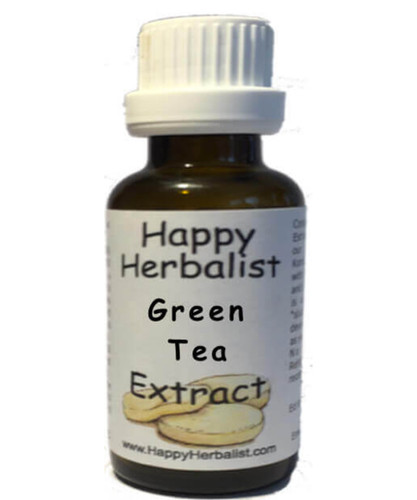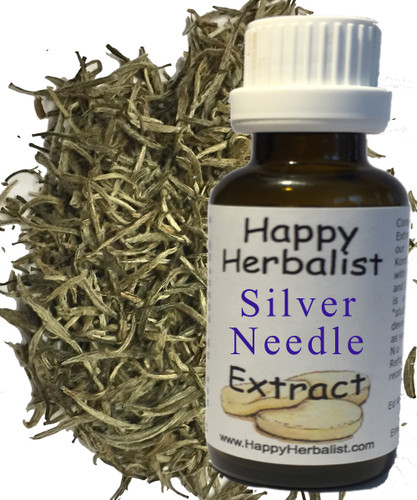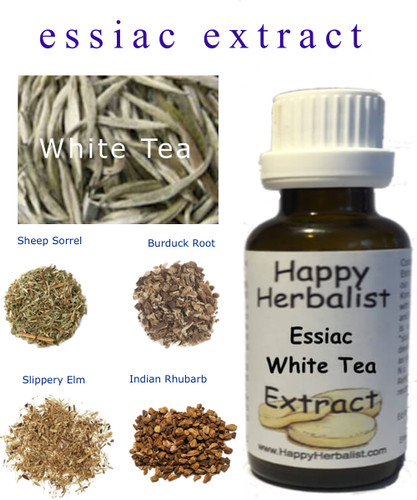Description
Shu Mee Extract. 30 ml European Dropper Bottle Great for Traveling. Alcohol Free
Traditional Chinese Medicine has long been treasured Camellia Sinensis (tea) as a herb that may be simply drunk daily (as a cup of tea) as well for its many uses in herbal formulas. To gain any more immediate health benefits, you would need to drink around 3-4 cups of tea every day. You can also get your green tea in capsule form, but there have been no studies done on the effectiveness of such pills. TCM still views tinctures or teas as the most effective form of medicine. The tea extract in liquid form has been researched and proven to be affective.
Shu Mee despite being on the low end of premium white teas has the finer properties attributed to white teas. Shu Mee is picked late April, May and June. The tea is somewhat mixed flat and some twigs. Leaves are the second and third. Our Shu Mee has a more pronounced taste profile - almost oolong tea-like. White tea drinkers who prefer more "substance" to the tea find Shu Mee delievers with a mellow slightly nut taste. Compared to our Silver Needle White Tea, Shu Mee has less caffeine and a stronger taste or "substance" In our presentation of teas. Shu Mee is akin to the Oolong classification that is on the other end of the spectrum of teas. Where Oolong is somewhere bewteen a Green (unfermented) and a Black (fermented) Tea, Shu Mee is between a Green (unfermented) and the Silver Needle (least air dried of the teas). Oh, just in case you're interested the Chinese encyclopedia of teas lists 138 distinct green varieties, of which there are more than 12,500 subgroups
White tea is one of those 12,500 sub-catagories of Green Tea. White teas are simply quickly air-dried. They represent the least fermented of all categories of teas. They also appear to be highest in antioxidants. According to recent Japanese studies (cancer research) white teas offer the highest in medicinal value. Some folks reason that since white teas are the least fermented, less than the typical green, then they should contain the least caffeine. But they do not. The caffeine varies greatly dependent upon what part of the tea plant and the time the leaf is picked. Early morning, Spring, tender young buds and new growth leaf, and only the first few leaves are actually one of the highest in caffeine. Interesting the western cosmetic industry is beginning to use white tea extract to be worn underneath moisturizers. Reason, white tea has been shown to be more effective in mopping up free radicals that cause skin to sag.
One cup of green tea contains from 100-200mg of EGCG.
Decaffeinated green tea does not show the same benefits as green tea left in its natural state.
Camellia Sinensis is real tea not an adulterated herbal blends. There are really only three categories of teas green, oolong, and black. "black" is fully fermented, "oolong" is partially fermented, and "green" is not fermented at all, only steamed. Types of tea such as Ceylon and Darjeeling refer to the region in which they are grown. Royal Pu-erh is a high grade fermented Black tea that undergoes an additional aging process that imparts the "Pu-erh" unique character taste and health reputation. Others are named for the character, shape or other distinctions feature of the over 4,000 varieties of tea available.
For What, and How is Green Tea Extract Used?
Cancer, especially studied were breast and prostate cancer
High Cholesterol
Weight loss, burn calories mainly through their caffeine content (White Tea has the least caffeine - Pu-erh the most)
High Blood Pressure
Digestive Aid (Pu-erh has the highest perceived benefit)
Years of research, in the United States and Japan support the theory that Tea (Camellia Sinensis) has the ability to ward off many types of cancer. Controlled studies on green tea extract - and WHITE Tea in particular have yielded impressive results.
Green tea extract force cancer cells to die in a sort of cellular suicide, a condition scientists call "apoptosis".
The belief is that polyphenol (-)-epigallocatechin gallate (EGCG) have an inhibitory effect on the enzyme, urokinase, which is required for tumor formation, thus preventing the formation of tumors in the first place.
Green tea's antioxidants have been shown to be highly beneficial to the heart - they help prevent the oxidation of LDL cholesterol.
Green tea has been show to be anti-bacterial, able to kill the potentially deadly Staphylococcus aureus and the bacteria that causes acne, Bacterium acne.
More than 5 cups a day may increase your odds for pancreatic cancer; 1-4 cups shows only benefits, so 1 or 2 cups a day is probably just right.
Green Tea contains natural caffeine and other Phenolic-containing antioxidant compounds. They activate the central nervous system, which may spar the body's ability to burn calories and unwanted fat cells through the Thermogenic process.
The phenol groups in Green Tea polyphenols are extremely active, easily able to capture and neutralize free radicals and other pro-oxidants. Researchers have found that EGCG is over 200 times more powerful than vitamin E in neutralizing pro-oxidants and free radicals that attack lipids (oils and fats). EGCE is also 20 times more potent than vitamin E in reducing the formation of dangerous and potentially mutagenic peroxides that form in rancid fats and lard.
EGCE is also known to confer protection against respiratory and digestive infections and food poisoning, while encouraging acidophilus growth and regularizing bowel habits. In laboratory studies, 500 mg. of green tea catechins per day have been shown to significantly lower blood pressure and possess anti-mutagenic activity. Additionally, at very high levels (0.5% to 1% of daily diet) green tea catechins reduced high total- and LDL-cholesterol levels in animal studies.
Green Tea blocks the attachment of bacteria to the teeth, protecting against cavities. Green Tea extract is non-toxic, both in acute doses and high long-term doses. There is no potential for causing mutation or birth defects, and no adverse effect on fertility, pregnancy or nursing.
A major concern with drinking so much tea is the caffeine. Though there is less caffeine in tea than in coffee, it does start to add up when drinking large volumes. But can you switch to decaf? The answer is, maybe. It all depends on how your chosen tea is decaffeinated. Tea that has been decaffeinated with a solvent (such as Ethyl Acetate) is going to have a much lower level of EGCG, than a tea that has been processed with a water/carbon dioxide method. Water decaffeinated tea will retain almost 95% of its EGCG.
Additional Details
- SKU:
- TXShu






